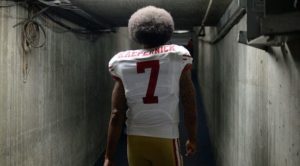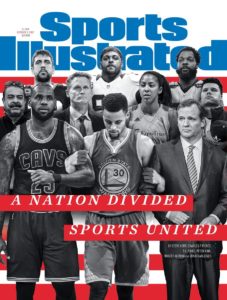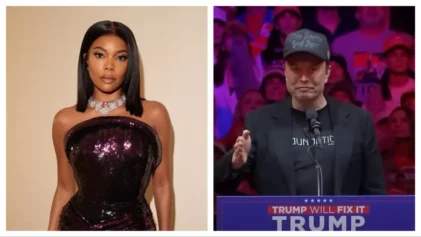
Just as former San Francisco 49ers quarterback Colin Kaepernick’s football talent is no longer on display, the meaning of his national anthem message was obscured by last week’s NFL displays. (Image courtesy of Yahoo.com)
Former San Francisco 49ers quarterback Colin Kaepernick captivated legions with his season-long national anthem protest last year. He explained his kneel-down as a refusal to “show pride in a flag for a country that oppresses Black people and people of color.” The QB’s crusade is regularly blamed for both the alleged plunge in NFL television ratings and Kaepernick’s current unemployment, with white viewers and league executives alike assumed to be intolerant of his dissent.
Hopes of leaving Kaepernick and the anthem kerfuffle in the scrapbook of seasons past were eviscerated last weekend when more than 200 NFL players from London to California declined to stand for Francis Scott Key’s “The Star-Spangled Banner.” The mass kneel-down was prompted by President Donald Trump’s excoriation of NFL players who refuse to rise for the nation’s hymn.
A sizable number of citizens regarded a couple hundred mostly Black males kneeling as lewder than the potty-mouthed commander-in-chief.
Missouri entrepreneur Jason Burle, an Air Force veteran, used the front door of his business to parade his disgust with Kaepernick and his historical understanding of how white violence is used to quell Black insurrection. Using two NFL jerseys, Burle fashioned a makeshift doormat that reads: “Lynch Kaepernick.” In Pennsylvania, volunteer fire chief Paul Smith admitted to keeping a “list of no good” n—ers. After the Pittsburgh Steelers and head coach Mike Tomlin, a Black male, remained off the field for the national anthem this past weekend, Smith reported that Tomlin is now on the list. Days later, Smith resigned from the fire department. This former serviceman and public servant were part of a chorus of white anger spewed at any and all Kaepernicks, Black athletes deviating from the cultural tradition of mute Black labor and white amusement.
Sociologist Dr. Harry Edwards authored “The Revolt of The Black Athlete,” which chronicles the upsurge of Black activist-athletes, like Muhammad Ali, during the 1960s. Speaking on “Democracy Now,” Dr. Edwards contrasted the previous era with last weekend’s anthem protests, saying, “In 1960s, you had pockets of athletes who were engaged in political activities, some of the greatest sports personalities in the history of this country, but there was nothing on this scale. Mr. Trump has managed to precipitate something that all of us, activists and intellectuals and media types, would never have been able to achieve.”
The assortment of kneelers didn’t always express what they hoped to achieve. When articulated, the goals weren’t in unison, and practically no one restated Kaepernick’s organic motivation for the anthem protest: ending the oppression of “Black people and people of color.” The elimination of emphasis on Black liberation strongly suggests authentic political action has been diluted, if not hijacked.
Days after the 2016 funeral of Muhammad Ali, NBA superstars Carmelo Anthony, LeBron James and others used the ESPN Espys to broadcast their opposition to racial profiling, police brutality and gun violence. Journalist Bill Rhoden, who wrote “Forty Million Dollar Slave,” commended their effort and issued a warning. “Next thing you know, your movement has been hijacked.” He feared trendy dissent cleaved from a Black agenda would supplant the grassroots efforts of Black athletes.
Other NFL players and athletes beyond football mimicked Kaepernick’s kneel, but predictably omitted his stance on racism. One of the world’s most rare sportsmen, Black pro hockey player P.K. Subban was asked if he would bring Kaepernick’s anthem protest to the NHL. Detailing why he would not join the demonstrations, Subban noted a lack of clarity and posed a question: “I also feel that the original message that was trying to be communicated has been lost. The focus has shifted to the act of kneeling itself or to a protest of the flag or the military. What are we really talking about here?”
The answer to Subban’s question varied depending on which kneeling player was talking. Retired Baltimore Raven Ray Lewis, who previously advised Kaepernick to keep his politics private, said, “I didn’t drop on one knee and order the protest. I dropped on two knees so I can simply honor God in the midst of chaos.” Lewis dropped to two knees as fellow members of the Ravens organization knelt during ceremonies before the Ravens’ 44-7 loss to the Jaguars in London last week.
The Denver Broncos’ Von Miller said he knelt because “We felt like President Trump’s speech was an assault on our most cherished right, freedom of speech.” Sunday worship, retaliation against an unpopular and profane president, and other interests motivated hundreds of players to stiff-arm the national anthem. Kaepernick’s original talking point about ending racial oppression was fumbled.

Sports Illustrated’s latest issue explores the controversial national anthem protests. Colin Kaepernick was omitted from the cover.
Conspicuously dropped from the NFL, Kaepernick was also snubbed from the new Sports Illustrated cover. Featuring photoshopped images of Black and white sports figures locking arms, the issue addresses the national conflict sparked by the anthem protests. NBA champion Stephen Curry, one of ten people spotlighted on the cover, scorned the omission, saying, “It was terrible, just kind of capitalizing on the hoopla and the media and all that nonsense.” Obscuring the origins of political events is poor journalism. Redacting mention of the hourly terrorism targeting Black people castrates protests even as they spread.
President Trump and many of his adversaries share one common belief. Kneeling “SOBs” are causing many people to stop watching football. The Baltimore Sun conceded football viewing is down, but added, “Pro football games remain among the most-watched things on television.”
The Star-Telegram attached a single caveat: viewers still love the Dallas Cowboys. Playing during Monday evening’s exclusive prime-time slot, “America’s Team” posted the second-highest television ratings for a Monday night football game in two years. Some speculated-the protests drove viewers to tune in early to spectate as Jerry Jones, the white team owner and a Trump supporter, lead his mostly Black players on the field to take a knee before, not during, the national anthem.
America’s team triumphed, racial oppression was ignored, and the team’s Dez Bryant reports they’ll be reverting to their usual standing routine during this weekend’s anthem.
Those who thought last weekend’s historic protests would endure are already being disappointed. The Green Bay Packers and Chicago Bears tussled on Thursday night, and not one knee touched the ground during the anthem.
Last week’s kneel-downs weren’t a gridiron revolt. Like Black speech, music and fashion, even grassroots Black protest is appropriated.
Gus T. Renegade hosts “The Context of White Supremacy” radio program, a platform designed to dissect and counter racism. For nearly a decade, he has interviewed and studied authors, filmmakers and scholars from around the globe.


